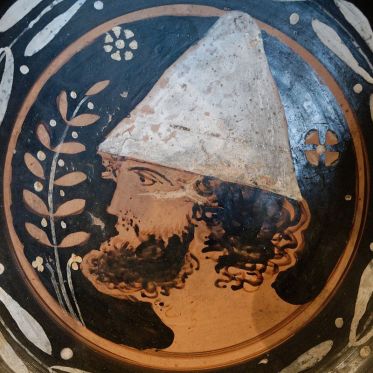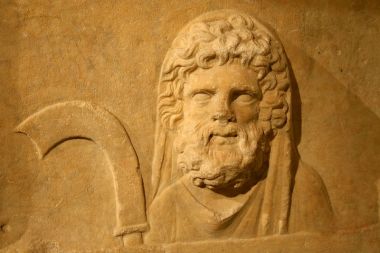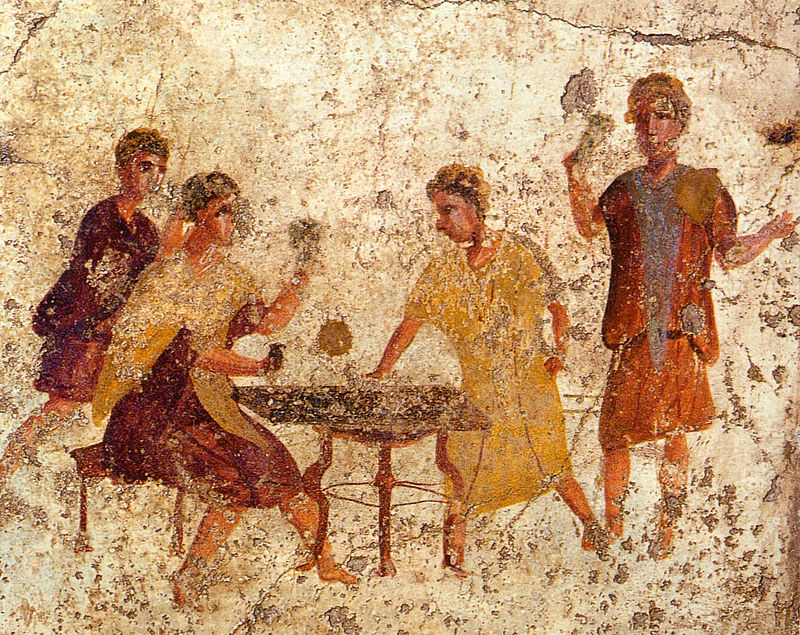The main winter festival in ancient Rome, held annually between 17th and 23rd December, was Saturnalia, the main features of which were gift exchanging, partying and the consumption of vast quantities of food (like Christmas) and role reversal (unlike Christmas). Depending on individual family tradition (in much the same way that how we celebrate Christmas can differ widely from family to family), children might get to boss their parents around for a day, women might be the household decision makers, and in some recorded cases masters and slaves switched places, with the slaves eating a feast before their masters (though the slaves would still have prepared the food, the masters in all likelihood not knowing how). Macrobius (fl. 5th century AD) writes:
“Meanwhile the head of the slave household, whose responsibility it was to offer sacrifice to the Household Gods, to manage the provisions and to direct the activities of the domestic servants, came to tell his master that the household had feasted according to the annual ritual custom. For at this festival, in houses that keep to proper religious usage, they first of all honor the slaves with a dinner prepared as if for the master; and only afterwards is the table set again for the head of the household. So, then, the chief slave came in to announce the time of dinner and to summon the masters to the table.”
Gaudy clothes in a Greek style would be worn to Saturnalia dinner, as opposed to the more reserved traditional Roman style of dress, and everybody, including slaves, went about wearing the pileus, a cap that symbolised liberty and free status. This was at odds with the normal expectation of the inhabitants of the empire to go about bare-headed.

Gambling, normally frowned upon by a society that prided itself on morals and dignity, was permitted and encouraged for all, including slaves. The festival was also seen as a time for free speech, normally suppressed to some degree or another depending on who was Emperor. It was silently understood by all, however, that the time of unalloyed liberty would pass, and that it was therefore best not to overtly offend or harm a social superior just because it was Saturnalia.
By tradition, the holiday was brought in with a shout of “Io Saturnalia!”, and people often composed short Saturnalia poems to give along with gifts, similar in concept to Christmas cards. Each city would appoint a “King of Saturnalia” from among its populace, who could issue nonsensical commands that had to be obeyed. “Sing naked” and “Throw him into cold water” are both attested orders. This position only starts to be recorded with the advent of the Empire in place of the Republic, and it was likely that the King of Saturnalia was intended as a parody of the Emperor. Not that that stopped emperors or their families from partaking in the parody; as a young man, the future Emperor Nero was once King of Saturnalia.
Saturnalia was a time of year that was greatly looked forward to by the vast majority of Romans. Seneca the Younger (4 BC – 65 AD), wrote in a letter to a friend:
“It is now the month of December, when the greatest part of the city is in a bustle. Loose reins are given to public dissipation; everywhere you may hear the sound of great preparations, as if there were some real difference between the days devoted to Saturn and those for transacting business. … Were you here, I would willingly confer with you as to the plan of our conduct; whether we should eve in our usual way, or, to avoid singularity, both take a better supper and throw off the toga.”

Some, inevitably, as with any mass gathering of friends and relatives found the festivities a little too much. Pliny the Younger (61 – 113) tells us, for example, that it was his custom to retreat to his study “when the rest of the house is noisy with the licence of the holiday and festive cries. This way I don’t hamper the games of my people and they don’t hinder my work or studies.”
Let’s be honest; we all know – or are – a Pliny.
Featured image: Fresco depicting Saturnalia dice players from Pompeii
Sources:
- Robert Parker, On Greek Religion
- Henk Versnel, Saturn and the Saturnalia
- Fanny Dolansky, Celebrating the Saturnalia
- Horace, Satires. Translated by Catherine Keane
- Seneca, Epistulae. Translated by Richard M. Gummere
- Tacitus, Annals. Translated by Alfred John Church
- Pliny the Younger, Letters.

One thought on “IO SATURNALIA! – A Very Roman Christmas”